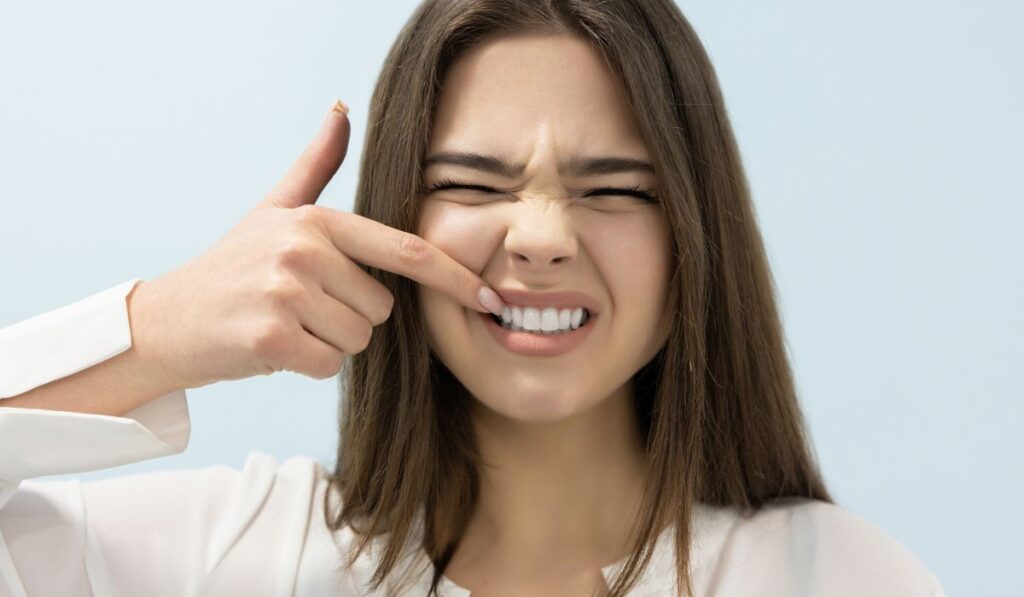Gum pain is a common complaint, and most people will experience it at some point in their lifetime. However, when it happens, it can be challenging to know what is causing it and how it should be treated.
Most gum pain cases are caused by poor dental hygiene, which can easily be remedied by brushing and flossing correctly. However, there are some more sinister causes of gum pain, such as gum disease or an allergic reaction, and a dentist should evaluate these cases.
But how do you know when you should see a dentist or try a home remedy? So Let’s look at some of the more harmless causes of gum pain and how to solve them versus when you should see a dentist.
Why Do I Have Gum Pain?

There are several reasons you may be experiencing gum pain but don’t panic, as not all of them are dental emergencies.
Paying attention to your body is essential to find out what is causing your gum pain. Take note of when your gums hurt the most and any other symptoms you may have.
Gums that hurt and bleed all the time might be a medical issue, while gums that hurt occasionally may be able to be remedied at home. Sometimes keeping a journal of symptoms and the food you are eating can help you nail down why your gums are hurting.
Receding Gums
Receding gums in a condition where your gums are moving back to expose more of your teeth. If you have gum pain accompanied by receding gums, this can be caused by several conditions.
Periodontal Disease
Periodontal disease is an infection that destroys your gums. This is the most common reason that gums recede and is something that needs to be treated by a professional.
Genetics
Some people, unfortunately, are genetically predisposed to having receding gum lines. In this case, it is still better to see a dentist to be sure of the cause, but there isn’t much that can be done.
Hormonal Changes
Along the line of genetics, some women also experience receding gums due to hormonal changes. These changes can happen during puberty, pregnancy, and menopause.
Regardless of whether or not you think you are experiencing any of these, it would be best if you still discussed receding gum lines with your dentist.
Insufficient Care
Many people have receding gums because they don’t care for their teeth properly. To avoid receding gums because of insufficient care, you should brush your teeth twice daily, floss once daily, and use an antibacterial mouthwash.
Inflammation Pain
Inflammation pain is a common cause of gum pain. Inflammation pain occurs when the gums are irritated and extra blood flows. This happens for several reasons.
Brushing Your Teeth Too Hard
The most common cause of gum pain is brushing your teeth too hard. Your gums are delicate, and while they need to be brushed, they should be brushed gently to avoid damaging them.
Gum Disease
Unfortunately, there are more sinister reasons your gums could be hurting, such as gum disease. If your gum pain is accompanied by bleeding, it’s more likely you have gum disease.
Tobacco Use
Tobacco use damages your gums. If you are a smoker or chew tobacco, you are causing damage every time you use one of these products. This damage can cause your gums to hurt.
Burns
Believe it or not, you can burn your gums when you eat food that is too hot. After the burning incident, your gums can be further inflamed when you brush them too hard.
Gum pain due to burns should clear up within ten days. However, if your gum pain persists, then it is likely caused by another problem.
Poor Dental Hygiene
As you may have guessed, one of the significant causes of gum pain is poor dental hygiene. Therefore, your gum pain is likely caused by your lack of care for your teeth if gum pain is your only symptom.
Poor dental hygiene happens when you do not brush your teeth twice a day, floss correctly, or use an antibacterial mouthwash. You may also not be brushing your teeth for a long enough period.
Those experiencing gum pain because of poor dental hygiene can later develop diseases that show other symptoms, which is why it is vital to address this cause of gum pain right away.
Allergic Reaction
An allergy is one of the more severe reasons your gums could hurt. For example, you may be allergic to your dental hygiene products or a type of food. This is more common when you know you have good dental hygiene but still have painful gums.
If you think your gum pain results from an allergy, start by eliminating one thing at a time. For example, switch your toothpaste to a different brand for one month and see if that helps. If not, go back to your old toothpaste, swap your mouthwash out for a different product, and so on.
You can do the same with foods in your diet; this is where a food journal may come in handy. This way, you can catalog which days you have more gum pain after eating certain foods.
How to Treat Gum Pain
In most cases, you can treat gum pain at home using the following methods. If, however, you have other symptoms like fever, bleeding, or headache, it’s crucial to seek a dentist rather than try the methods below.
Flossing

The number one cure for gum pain is regular flossing. You should be flossing once a day and after eating anything which gets in between your teeth. You will be surprised by how quickly this remedies your gum pain.
Warm Water Rinse
Mix a tablespoon of salt in warm water and rinse your mouth. This can help lower the inflammation of your gums and should help with the pain.
Swap Out Your Toothbrush
Remember, gum pain can be caused by brushing too hard. So look at your toothbrush and consider swapping it out for one with softer bristles.
Use a Water Pick
Sometimes people experience inflammation as a result of flossing. When this is the case, they may find that a water flosser (on Amazon) is more gentle on their gums and gets the job done.
A water flosser is typically plugged into the wall and directs a stream of water at your gums. Use this instead of the thread floss once a day on your teeth.
Pain Killers
You can take over-the-counter painkillers for gum pain, such as Tylenol or ibuprofen. Be cautious, however, as while this is fine for a day or two, you should not rely on medications to resolve your gum pain. Instead, work to find the root cause of your gum pain.
There are also pain-killing gels that can be applied directly to your gums. But just like oral painkillers, you should not rely on these to solve your gum pain.
Final Thoughts on Gum Pain
Overall, gum pain can be caused for a variety of different reasons. Depending on the cause of your gum pain, the solution will vary. Any gum pain that is severe and accompanied by other symptoms should be looked at by a dentist as soon as possible.


